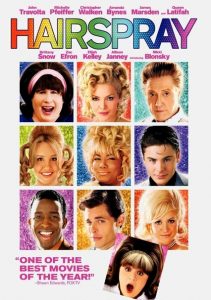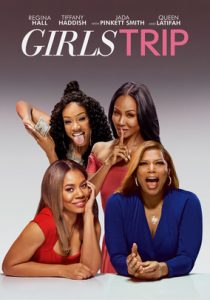Hairspray-2007
Director Adam Shankman
Starring Nikki Blonsky, John Travolta, Christopher Walken
Scott’s Review #1,095
Reviewed December 28, 2020
Grade: B+
Hairspray (2007) is a fun film, without being superfluous. The third incarnation of the musical treat doesn’t disappoint, offering a brighter production.
A safer affair than the 1988 escapade directed by naughty filmmaker John Waters, it’s nonetheless not a “watered” version either. It loses none of the charm that the original had and includes plenty of big-name stars.
In short, it’s a solid summer popcorn flick with sing-along tunes and a cool vibe.
The important message of racial relations is not lost nor dismissed.
The setting is early 1960s Baltimore, Maryland, a city rife with racial problems representing the entire United States during that decade.
Our star, Tracy Turnblad (Nikki Blonsky) is a chubby, bubbly, sixteen-year-old, who wants nothing more than to trudge through the school day and come home and indulge in her favorite television show, The Corny Collins Show, a popular local dance competition.
Tracy auditions for a spot on the show, and wins. She became an overnight celebrity, a trendsetter in dance, fun, and fashion. She and her fans hope that her new status as a teen sensation is enough to topple Corny’s reigning dance queen, Amber von Tussle (Brittany Snow), and bring racial integration to the show.
Amber’s racist mother, Velma (Michelle Pfeiffer) manages the television station and thwarts Tracy’s efforts, leading to tension and a dance competition between Tracy and Amber.
The casting is a big part of the success. Blonsky, making her film debut, carries the film flawlessly. Both energetic and empathetic, she is the perfect girl next door and relatable for any young girl who is not a stick figure.
More broadly, she represents anybody who feels like a misfit or is put upon for not being classified as perfect. Her joy and sincerity as she sings and dances to “Good Morning, Baltimore” and “I Can Hear the Bells” is infectious and makes her a perfect protagonist.
The supporting cast is delightful and laden with A-list Hollywood stars having a ball with their over-the-top roles.
My favorite is John Travolta as Tracy’s mother and compadre, Edna. Fans of Hairspray know that Edna is always cast with a male actor in drag and Travolta is fantastic. His mannish body and movements only make the character more fun and fabulous.
And with his beehive hairdo and pink ribbon he is so darn cute!
Tracy’s father, Wilbur, is played by Christopher Walken. His love for his wife and daughter is sweet. Pfeiffer fuels her one-note character with venom as the racist woman gets her just due.
Director, Adam Shankman, puts the focus on the musical numbers, and that’s just fine. For added pleasure, he includes both John Waters and Rikki Lake (the original Tracy) in cameo roles, which is a treat for anyone who has seen the original.
The best numbers occur when the entire company joins in, especially the wonderful finale, “You Can’t Stop the Beat”. Besides being musically contagious, the song sends an important message of progression and embracing change.
Despite the fluffy trimmings, the important message of racial inequality is not overlooked, nor does it feel dated in the year 2007.
Racism is still an issue. Justifiably so, the racist characters like Velma and Prudence Pingleton (Allison Janney) look ridiculous with outrageous fear for anyone different than themselves.
Tracy and her friends champion causes like racism, integration, and being true to oneself, which are themes at the heart of the film, along with the merry songs.
While I still prefer the 1988 version of Hairspray for more seediness and a colder vibe, Hairspray (2007) is a colorful rendition that exposes a new generation to the chirpy and danceable tunes while maintaining the important themes.
It’s a family-friendly affair and a very funny experience without sacrificing any credibility.

